The phrase “edge computing” might bear all the earmarks of an annoying buzzword, but don’t let that distract from the market’s upward momentum — global internet of things (IoT) revenue is forecast to hit $1.7 trillion by 2019, when the number of IoT devices connected to the internet will exceed 23 billion, according to analysts at CB Insights. But despite the industry’s long and continued growth, not all organizations think they’re ready for it — in a recent Kaspersky Lab survey, 54 percent said the risks associated with connectivity and integration of IoT ecosystems remained a major challenge.
Zededa’s eager to supply solutions. The edge virtualization startup, which was cofounded in 2016 by entrepreneurs Erik Nordmark, Roman Shaposhnik, Said Ouissal, and Vijay Tapaskar, today revealed that it has secured $15.9 million in series A financing co-led by Energize Ventures and Lux Capital. The oversubscribed round — in which Wild West Capital, Almaz Capital, Barton Capital, and former Motorola CEO and Sun Microsystems COO Ed Zander also participated — brings the company’s total raised to $18.98 million, and will see Wild West Capital’s Kevin DeNuccio, Energize Ventures’ Juan Muldoon, and Lux Capitals’ Bilal Zuberi join Zededa’s board of directors.
Based in Santa Clara, California and India, Zededa intends to put the newfound capital toward expanding its infrastructure and workforce, Ouissal, who serves as CEO, told VentureBeat. “Building, deploying, and running apps at the edge should be just as easy and secure as it is for the cloud today,” he added.
Zededa’s real-time, hardware- and cloud-agnostic software suite enables app deployment over virtually any edge network, thanks in part to a technology stack — the Edge Virtualization X (EVx) engine — that’s based on open standards. It supports hardware platforms built on both Arm and x86 processors from Advantech, Lanner, SuperMicro, Scalys, and other vendors, and it leverages a system of hypervisors and unikernels — software packages consisting of apps, their dependencies, and core operating system bits that periodically communicate with Zededa’s cloud — to ensure edge installations reliably behave as they should.
June 5th: The AI Audit in NYC
Join us next week in NYC to engage with top executive leaders, delving into strategies for auditing AI models to ensure fairness, optimal performance, and ethical compliance across diverse organizations. Secure your attendance for this exclusive invite-only event.
There’s an abundance of tools promising to simplify IoT analytics and management at the edge — Google’s Cloud IoT Edge, Amazon’s AWS IoT, Microsoft’s Azure Sphere, and Baidu’s OpenEdge come to mind. But Ouissal points out that, excepting platforms like Canonical’s Ubuntu Core, most of these are proprietary.
[O]ur vision [is to create] a cloud-native edge that is open source, ultra secure, and standards-based,” he said. “Removing the complexity of edge infrastructure in a way that is secure and vendor-agnostic enables far greater control over corporate data. That, in turn, boosts business agility and innovation through the use of distributed and local [artificial intelligence] and IoT applications acting on the massive amounts of edge data generated per second.”
To further Zededa’s goal of building a common framework for edge computing, the company recently joined the Linux Foundation’s EdgeX Foundry, an ongoing vendor-neutral open source IoT project. Zededa is also part of the Foundation’s LF Edge umbrella organization, where it’s incubating Project Eve, an interoperable container framework built around the Edge Virtualization Engine — the open source version of EVx — and the telecom-oriented Akraino Edge Stack.
Zededa’s targeting the second quarter of 2019 for version 1.0, which it hopes to release alongside a software development kit for Eve containers. An app store platform will follow later in the year.
“Interoperability and convergence on common industry standards is vital for organizations deploying next-generation distributed computing solutions at the IoT Edge,” Jason Shepherd, chair of the EdgeX Foundry governing board and Dell Technologies IoT CTO, said in a statement. “By joining EdgeX Foundry’s efforts, Zededa will help promote the project’s important work of creating an open ecosystem of secure, interoperable edge applications that will change user experiences and drive the future of business.”


